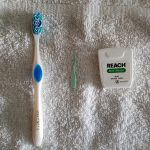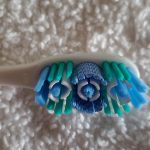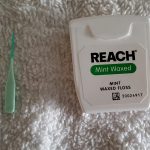Welcome back! Last week, we talked about gossips. If you missed that blog and would like to catch up, click HERE.

Have you ever been to the dentist and received a bad report? Gums inflamed? Cavities? The dreaded root canal? An extraction? You are not alone.
Sometimes, it seems as if nothing you do makes any difference. You brush your heart out and get told that you are “being too rough” and they tell you the gum line is shrinking due to over brushing, right? Or you’ve flossed and flossed and yet that plaque just seems to stick around (pun intended). I get you. I am you.
Only recently have I found some keys to getting a good dental report, and I’d like to share them with you so that maybe, just maybe, one of you won’t have to suffer as many do. I can’t say I personally suffered, but I sure was frustrated! Puffy gums hurt, don’t they…yes they do.
First, let’s talk about toothpaste.

The best advice I can give you here is always put on your glasses before you use toothpaste because many, many tubes look just like your toothpaste tube, such as the hemorrhoid creme tube. I can speak from personal experience when I tell you that this tube doesn’t brush well. It cakes up on your teeth and doesn’t lather at all. You end up yelling for your husband to come and help you because you have decided that this isn’t toothpaste at all and you have no idea what you just put into your mouth. (He will laugh until he cries and the story will be repeated several times a year when you meet new people, I promise you this, so just wear your glasses).
The toothpaste they sell at the dentists’ office really does add a layer of protection to your choppers. I highly recommend using their stuff. It’s spendy, but also lasts a lot longer than commercial paste.

OK, so we’re done with the toothpaste situation. Let’s move on to the toothbrush itself. The soft brush was recommended by my dentist, but I could never really get into all the nooks and crannies with the average brush. I only recently discovered this brush (look at the picture). It hugs your gums and teeth. Truly. It’s like a mini massage on the gumline. You can feel it wrap its brushy love around the back of the molars in the recesses of your jawline, cleaning them and creating a feeling of pure bliss. I’m not even getting paid to say this. Colgate makes this brush, and you will not be disappointed. You can say with confidence, “gingivitis, get behind me!”.

Whew, that was passionate but sincere. Now on to the flossing debacle. I swear to you (and to my dentist) I was flossing twice a day. I thought I was doing it correctly, yet the plaque built. My dental hygenist recommended these little picks (look at the picture). I was skeptical at first but soon realized the advantage. I flossed, then picked, and food came flying out. In my head, I was thinking, “are you SERIOUS right now”? No wonder I was getting plaque build-up! Using these picks completely changed the landscape and my dental report.
There are many issues that factor into good oral health and I would like to lightly touch on a couple of them. For example, certain medications or autoimmune disorders can create dry mouth. According to LSU School of Medicine, saliva is super important because (1) Saliva contains enzymes and antibodies that can directly attack the bacteria of dental plaque. (2) Saliva neutralizes acids released by decay-causing bacteria. (3) Saliva contains minerals (including calcium, phosphate, and fluoride) needed to replace lost minerals from tooth surfaces. Therefore, good saliva production is important for dental health, and factors that compromise good saliva production contribute to dental decay.
Diabetes is another issue cited by LSUSOM, “Studies show that patients with poorly controlled diabetes have periodontal disease more often and more severely than those with good control of diabetes. Also, patients with poorly controlled diabetes have more incidence of tooth loss. Studies have also linked an increased risk for gum disease among diabetics who smoke. Smokers with diabetes, age 45 or older, are twenty times more likely to develop severe periodontal disease compared to individuals who do not smoke and do not have diabetes”.
So there you have it. If you didn’t retain anything else by reading this week’s blog, just remember to wear your glasses when choosing the tube of toothpaste. I have no idea why hemorrhoid creme was on the bathroom counter, but I do know why it doesn’t work as toothpaste. I took the bullet for you. You’re welcome.
See you next week, Dear Reader…
Editors note: This blog is not a replacement for sound medical advice, and many diseases, disorders, and syndromes have symptoms that overlap. Only a qualified medical professional can diagnose you. That said, if you think this blog may be helpful to others, please hit the Facebook Icon and share it on your personal pages. Thank you for reading us, we really do appreciate you!
1 Comment